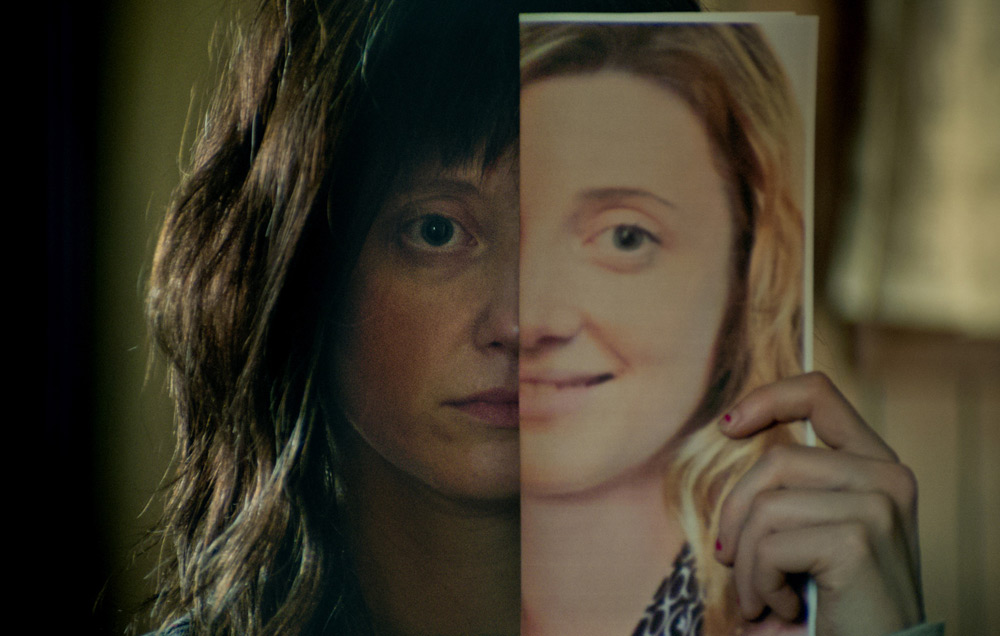“I could be a total creep from the Internet, for all you know,” Jeb (John Leguizamo) tells Nancy (Andrea Riseborough) at a nondescript diner in an early scene from Christina Choe’s beguiling feature directorial debut, unaware that he’s not even calling Nancy by her real name, but “Becca,” her online nom de plume. Like many things with Nancy, there’s some truth in what she’s doing at the diner, even if it’s under false pretenses, seeking out sympathy she probably deserves, even if it shouldn’t be coming from a man who really had the experience of losing a child while she carries on the lie that she started online that she’s struggling with her pregnancy. In fact, it is her mother Betty (Ann Dowd), who is her greatest source of frustration, lurching around at home in need of constant care, but unwilling to say a kind word about Nancy’s help that has likely pushed her towards fantasizing about other lives she could lead rather than the one she’s stuck in.
Through Nancy’s predicament, Choe creates both a wicked pitch black comedy and a riveting study of the truth we create for ourselves, whether it corresponds with reality or not. As it turns out, Nancy’s meeting with Jeb is just a warmup for an even bigger fib, learning on the local news of Ellen and Leo Lynch (J. Smith-Cameron and Steve Buscemi), whose daughter Brook went missing at the age of five three decades earlier. Sharing the same age and bulbous eyes as Brook, Nancy sees an opportunity to spend time in a loving home, surely aware that a DNA test will be in the offing, but loading her duffel bag and her cat Paul into the car to head for the Lynches’ home in the country. She isn’t disappointed when Ellen awaits with a Thanksgiving-sized meal that looks as if it’s been in the works for 30 years, and while Leo is skeptical, still referring to his daughter in the third person, Ellen embraces her far more easily, bonding over their shared love of Shirley Jackson and even suggesting using her perch as a comparative lit professor to contact friends in New York about getting Nancy’s work published. (We learn early The Paris Review isn’t interested in her pitches.)
Nancy enjoys the attention, offering specious recollections about being abducted at five and employing her real biography to suggest the mother she was born to kidnapped her, but even as the clock is ticking on whether she’ll be found out, you see how her presence affects Ellen and Leo in different ways, like Nancy taking the pieces that they want to hear from what she’s saying and discarding the rest. Choe has considerable fun toying with what might be real, rarely confirming definitively what is not, and with a cast gifted at expressing a lot with a little, “Nancy,” the carefully placed silences speak volumes, letting you know exactly where the characters stand while they themselves can never pin each other down. It’s impossible to take your eyes off Riseborough as the fragile yet calculating title character, and the only reason you would is to watch what Cameron does as Ellen, fighting her better judgment to allow the mother she once was gradually emerge.
The lifting of emotional barriers isn’t just beautifully portrayed by the actors, but evoked by the arresting compositions of cinematographer Zoe White (“Princess Cyd,” “In the Radiant City”) and an unsettling score from Peter Raeburn that grows more intense as the film wears on. But for a film in which everyone is grasping over some measure of control after living through unimaginable circumstances, Choe shows a strong hand in striking exactly the right tone, deriving the pleasure of getting away with something that Nancy may feel in pretending while provocatively exploring how imagination can become a part of identity, not only in what we project onto other people but how we justify our behavior to ourselves. While its heroine may be faking it, “Nancy” is a real discovery.
“Nancy” shows at Sundance on January 25th at 12:15 p.m. at the Eccles and January 26th at 9 p.m. at the Park City Library.





Comments 1